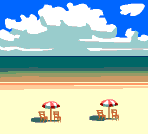|
English is not always quite
English in the Caribbean.
Alister Hughes guides
you through the region’s
special way with the language
nglish is not the natural
language of Trinidad and Tobago. Nor is it the native tongue of Grenada, St.
Vincent, St. Lucia, Dominica and a lot of other so-called English-speaking
Caribbean islands. Guide books may tell you otherwise but, believe me,
they’re wrong.
Don’t misunderstand me.
English is the official language of these former British colonies.
That’s what you’ll hear spoken in the hotels and shops. You’ll have no
problem communicating with the islanders. But don’t make the mistake of
believing that English is their native tongue.
For these islands have a
special vocabulary. It’s a vivid collection of expressive words and phrases
used by people in these parts when they don’t have to be on their best
linguistic behavior. Its origins are intriguing, and these unusual words and
phrases have become so interwoven with Standard English that a unique
Caribbean English has emerged.
However, it’s not
considered “respectable.” Caribbean English is banned from classrooms where
“proper” English is taught. Little boys and girls can get their knuckles
rapped for using it. Nevertheless, it flourishes. It’s used by all sectors
of the society as, if you listen carefully, you will hear.
ake for example, the
insights you get from the interesting and unusual use of the word foot.
A regional newspaper once reported tat a man had been charged in the
Magistrate’s court with wounding someone in the foot, “six inches above the
knee”. That sounds quite impossible. As everyone knows, the foot is not
above the knee, it is below the ankle.
But this seemingly
ridiculous charge didn’t surprise the Magistrate or anybody else. In these
islands, you see, the foot is the whole limb from the hip to the
toes. Just as hand is the whole limb from the shoulder to the
fingers.
And here’s the surprise.
These are Old English meanings. Three hundred years ago, when Britain was
carrying out her empire, English colonist in these islands used the words
hand and foot with exactly the same meanings as these words have
in Caribbean English today.
The French, too, left
footprints on the tongues of Caribbean people. An interesting example is the
French word démêler, “to disentangle”, which came into Caribbean
English as daymaylay. A person competent to extricate himself from a
difficult situation was said to be able to daymaylay himself.
A man or woman
head-over-heels in love was said to be tootoolbay. Derived from
totalement bête, “a completely stupid creature”, tootoolbay
perfectly describes the apparent disappearance of all common sense in the
love-sick.
Caribbean English also
created original words of its own. One example is the verb to lime,
which originally meant to stand in the street outside somebody’s party to
which one was not invited. That was “liming the fête.” Today, lime
also means to sit around idly and enjoy yourself.
n the mythology of the
islands, the Lajabless is a terrifying supernatural female. Deriving
her name from the French la diabless, “a female devil”, the
Lajabless has a beautiful figure. Abroad at night, she wears a
wide-brimmed, floppy hat which masks her face, and her long skirt hides the
fact that, while one of her feet is normal, the other is a cloven hoof.
Undoubtedly, lonely wives
created this myth. The story goes that some half-drunk husband, staggering
home late at night, is proposition by this seductive lady. Hand in hand,
they stroll to a secluded spot at the brink of a precipice where the
Lajabless lifts the brim of her hat disclosing a skull beneath.
Terrified, the husband falls over the precipice and dies.
Another fearsome
mythological figure in Caribbean English is the Lougarou or
Lagahou. This name is derived from the French loup-garou, “a
werewolf”, but the Caribbean version has special powers. The lougarou is a
human who, at night, can shed his or her skin and assume the ability to fly.
To get at the victim, this being can enter a room through a key-hole. But
there is a sure-fire way to protect oneself. Spread a cupful of sand on your
doorstep. No lougarou can get past without counting every grain. The
counting will certainly take until daylight and, at that time, lougarous
must re-enter their skins.
dictionary of Caribbean
English would run to several thousand words. Not to worry. Ask about words
you hear but don’t understand — you’ll be sure to get explanations.
In the meantime, enjoy your
lime in the Caribbean. I’m certain you’ll get tootoolbay over the
islands. Don’t forget my tips about the Lajabless and the lougarou,
and savour [sic] Caribbean English. It may help you to daymaylay
yourself. ■
|












